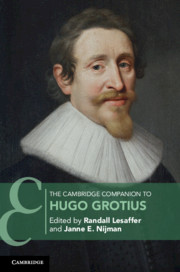Book contents
- The Cambridge Companion to Hugo Grotius
- Cambridge Companions to Law
- The Cambridge Companion to Hugo Grotius
- Copyright page
- Contents
- Contributors
- Preface
- Chronology
- Abbreviations and Short Titles of Works by Grotius
- Editions and Translations of Grotius’ Work
- Introduction
- Part I Grotius in Context
- Part II Concepts
- 4 Virtue
- 5 Trust (Fides)
- 6 Natural Law as True Law
- 7 Sociability
- 8 Sovereignty
- 9 Church and State
- 10 Predestination
- 11 Rights (I)
- 12 Rights (II)
- 13 Property, Trade and Empire
- Part III Grotius as a Man of Letters, Theologian and Political Writer
- Part IV Grotius as a Legal Scholar
- Part V The Reception of Grotius
- Index
- References
8 - Sovereignty
from Part II - Concepts
Published online by Cambridge University Press: 03 September 2021
- The Cambridge Companion to Hugo Grotius
- Cambridge Companions to Law
- The Cambridge Companion to Hugo Grotius
- Copyright page
- Contents
- Contributors
- Preface
- Chronology
- Abbreviations and Short Titles of Works by Grotius
- Editions and Translations of Grotius’ Work
- Introduction
- Part I Grotius in Context
- Part II Concepts
- 4 Virtue
- 5 Trust (Fides)
- 6 Natural Law as True Law
- 7 Sociability
- 8 Sovereignty
- 9 Church and State
- 10 Predestination
- 11 Rights (I)
- 12 Rights (II)
- 13 Property, Trade and Empire
- Part III Grotius as a Man of Letters, Theologian and Political Writer
- Part IV Grotius as a Legal Scholar
- Part V The Reception of Grotius
- Index
- References
Summary
A legal analyses of Grotius’s ideas on sovereignty in De jure belli ac pacis shows that political power is in fact the natural right of the political association to defend its rights and foster its well-being, transferred to one (monarchy), a few (aristocracy) of many (popular government). The power transferred from the association to the ruler can be absolute or conditional, complete or partial, perpetual or temporary, and the ruler can hold the right to rule in property, or have a usufructuary or precarious right to it. Notwithstanding the people’s right to resist their ruler(s) in some well-described cases of abuse of power, Grotius regards the ruler with a property or usufructuary right in political power as supreme (‘sovereign’), even if his power is limited. According to Grotius, power is supreme if the ruler’s actions are not subject to the legal control of another. Abuse of power beyond its limits is not an act of the political ruler, but of someone infringing on another’s rights.
Keywords
- Type
- Chapter
- Information
- The Cambridge Companion to Hugo Grotius , pp. 178 - 197Publisher: Cambridge University PressPrint publication year: 2021

